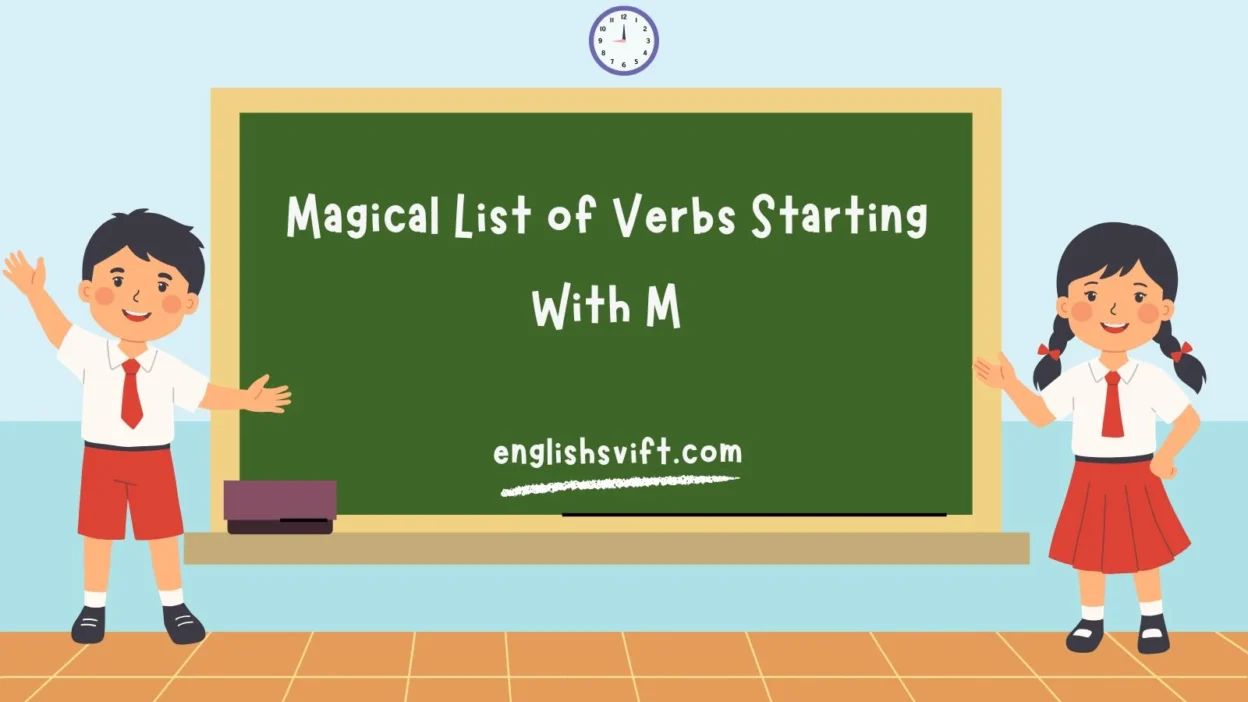Ever wondered how a single letter can unlock a world of expression? The letter “M” holds some of the most powerful, versatile, and inspiring verbs in the English language. From move and make to meditate and magnify, these words fuel our ability to express ideas vividly.
Whether you’re a student, writer, or professional, mastering M-verbs can instantly level up your communication. In this guide, we’ll explore meanings, examples, idioms, and real-life uses for over 150 M-verbs.
Get ready to motivate, mesmerize, and master your way through English like never before!
Why Verbs Starting With M Matter in English
Verbs are the heartbeat of any sentence — they give life, movement, and meaning to our words. And when it comes to verbs starting with M, you’re stepping into a vocabulary treasure chest.
From move to meditate, these verbs cover actions, emotions, processes, and even subtle states of being. Whether you’re a student, writer, language enthusiast, or just someone who wants to speak and write more clearly, mastering M-verbs can instantly boost your communication skills.
Understanding the Power of “M” Verbs in Communication
“M” verbs are versatile and dynamic. They can:
- Convey physical movement (march, mount, migrate)
- Express mental processes (meditate, muse, moralize)
- Describe creation or transformation (manufacture, mold, magnify)
- Show control or influence (manage, manipulate, monitor)
They also make your writing more vivid. Instead of saying:
“She worked hard to complete the task.”
You might say:
“She mastered every step of the project.”
That’s the power of precision.
Commonly Used Verbs Starting With M and Their Meanings
Here’s a quick snapshot of some everyday M-verbs you’ll hear in casual and professional settings:
| Verb | Meaning | Example Sentence |
| Move | Change position or place | We’ll move to a new office next month. |
| Make | Create or produce something | He can make a cake in under an hour. |
| Manage | Control or handle successfully | She managed the team well during the crisis. |
| Maintain | Keep in good condition | You must maintain your health through exercise. |
| Meet | Come into the presence of | Let’s meet for lunch tomorrow. |
Top 100 Verbs Beginning With M: From Everyday Speech to Professional Writing
The following table blends everyday English, academic use, and business contexts — a perfect resource for students, professionals, and writers.
| Verb | Meaning | Context Example |
| Magnify | Make something appear larger | Scientists magnify the image for study. |
| Manufacture | Produce goods in large quantities | They manufacture cars in Germany. |
| Monitor | Observe and check progress | We must monitor the machine’s temperature. |
| Motivate | Inspire to take action | Teachers motivate students to learn. |
| Merge | Combine or unite | The two companies merged last year. |
| Meditate | Focus the mind for relaxation or clarity | She meditates every morning. |
| Migrate | Move from one region to another | Birds migrate during winter. |
| Modify | Change or adapt | Please modify the design slightly. |
| Multiply | Increase in number | Their profits multiplied rapidly. |
| Marvel | Be filled with wonder | We marveled at the stunning view. |
The Diversity of M-Verbs: Actions, States, and Processes
M-verbs span three main dimensions of language:
| Category | Examples | Usage Focus |
| Actions | Move, March, Manage, Manufacture | Physical tasks, movement |
| States | Meditate, Muse, Moralize | Mental/Emotional states |
| Processes | Melt, Multiply, Monitor, Modify | Changes, ongoing actions |
This variety makes them indispensable in both speech and writing.
Physical Action Verbs That Start With M (Move, March, Mount…)
When you want to describe movement, force, or tangible activity, M-verbs shine.
- March → Soldiers march in formation.
- Mount → We’ll mount the TV on the wall.
- Muscle → He muscled the heavy box into place.
Abstract and Mental State Verbs Beginning With M (Meditate, Muse, Moralize…)
These verbs capture thought processes, emotions, and reflection:
| Verb | Meaning | Example |
| Meditate | Focus or reflect deeply | She meditated on the decision all night. |
| Muse | Think deeply or dreamily | He mused about the future. |
| Moralize | Comment on morals or values | The speaker moralized about honesty. |
Verbs of Manipulation and Creation Starting With M
From manual labor to artistic crafting:
| Verb | Meaning | Example |
| Manufacture | Produce in large numbers | They manufacture electronics in Asia. |
| Mold | Shape into a form | She molded the clay into a vase. |
| Modify | Make changes | We modified the schedule. |
Academic and Professional Usage of M-Verbs
In academic writing, verbs like measure, mediate, model, manipulate convey precision and formality.
Example:
Researchers measured the effects of meditation on stress levels.
M-Verbs in Daily Conversations and Social Interactions
M-verbs like meet, mention, mix, miss pop up in everyday talk:
“Did you meet the new neighbor?”
“Don’t forget to mix the ingredients.”
Grammatical Forms: Base, Participles, and Gerunds of M-Verbs
| Base Form | Past Simple | Past Participle | Gerund (-ing) |
| Move | Moved | Moved | Moving |
| Make | Made | Made | Making |
| Manage | Managed | Managed | Managing |
Mastering the Conjugation of Common M-Verbs
Conjugation mastery ensures fluency. For instance:
Verb: Maintain
- Present: I maintain
- Past: I maintained
- Future: I will maintain
- Perfect: I have maintained
Table of M-Verbs With Synonyms and Antonyms
| Verb | Synonyms | Antonyms |
| Move | Shift, transfer | Stay |
| Make | Create, produce | Destroy |
| Merge | Combine, unite | Separate |
Using M-Verbs for Clear and Effective Expression
Replacing vague verbs with specific M-verbs sharpens meaning:
- Instead of “do better” → “maximize efficiency”
- Instead of “look closely” → “magnify details”
M-Verbs in Writing: Academic, Creative, and Business Contexts
- Academic: “The study measured the impact…”
- Creative: “She murmured a secret.”
- Business: “We must monitor performance.”
Contextual Examples: M-Verbs in Sentences
| Verb | Example Sentence |
| Melt | The ice melted in the sun. |
| Motivate | Coaches motivate their teams. |
| Modify | We modified the plan after feedback. |
Idioms and Expressions Using Verbs Starting With M
- Make ends meet → Earn enough to live.
- Move mountains → Achieve something difficult.
- Miss the boat → Miss an opportunity.
Emerging and Modern M-Verbs in 2025 (Language Trends)
English evolves — verbs like micromanage, multitask, marketize are now common in digital contexts.
The Role of M-Verbs in Storytelling and Descriptive Writing
M-verbs create imagery and movement in stories:
“She moseyed down the lane, humming softly.”
Nuances and Subtle Differences Among Similar M-Verbs
Example: Migrate vs Move
- Migrate → Relocation over distance/time (often seasonal).
- Move → General change of location.
Tips for Remembering and Retaining M-Verbs in Your Vocabulary
- Use flashcards.
- Play word games.
- Write daily journal entries with new M-verbs.
Fun Activities and Games to Practice M-Verbs
| Activity | Description |
| M-Verb Bingo | Cross off M-verbs you hear in a conversation. |
| Story Challenge | Write a story using 20 M-verbs. |
The Evolution of “M” Verbs in English Over Time
From Old English roots to modern-day slang, M-verbs show linguistic adaptability.
Comprehensive M-Verb Reference Table (Meanings, Forms, Usage Notes)
| Verb | Meaning | Forms | Notes |
| Manage | Handle effectively | Manages, Managed, Managing | Common in business English |
| Mediate | Intervene to resolve | Mediates, Mediated, Mediating | Used in conflict resolution |
Conclusion: Building a Stronger Vocabulary With M-Verbs
Mastering verbs starting with M is more than a vocabulary exercise — it’s an investment in clarity, precision, and expression.
Whether you’re writing a report, telling a story, or having a chat, these verbs give your language color and depth.
FAQs
Q1: What’s the easiest way to remember M-verbs?
A: Use them in daily speech and writing — active use cements memory.
Q2: Are M-verbs common in academic writing?
A: Yes, especially in research contexts (measure, mediate, model).
Q3: Do all M-verbs have gerund forms?
A: Most do, but some irregular forms need special attention.
Q4: Can I use idioms with M-verbs in formal writing?
A: Rarely — idioms suit creative or informal contexts better.
Q5: What’s the most versatile M-verb?
A: “Make” — it adapts to countless contexts and meanings.


